











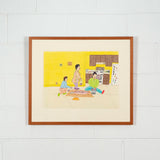

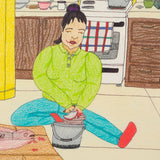
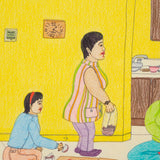
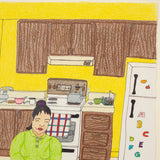

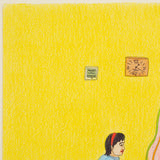



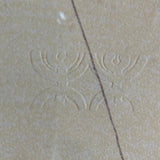
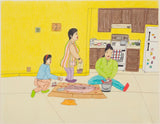
Annie Pootoogook
ANNIE POOTOOGOOK "IN THE KITCHEN", 2000
Annie Pootoogook (1969-2016) was a Canadian artist renowned for her drawings depicting contemporary Inuit life in Northern Canada. A pioneering visual storyteller, her artworks marked an important shift in national consciousness towards contemporary Inuit art and life.
Pootoogook's grandmother (Pitseolak Ashoona) and mother (Napachie Pootoogook) were both prolific and highly respected Inuit artists. Pitseolak Ashoona was one of the first Inuit artists to experiment with the medium of drawing as Inuit communities transitioned from their previous settlements into permanent communities in Northern Canada, where Pootgootook would be raised.
In 1997 Annie Pootoogook began drawing and became a third-generation female Inuit artist. Within a decade she received widespread acclaim for her singular artistic vision. Her distinct drawings depict her own experiences of contemporary Inuit life in Kinngait (previously Cape Dorset), Nunavut. Pootoogook's work offers an unfiltered and unique glimpse into a community rarely depicted in contemporary art.
Challenging notions of traditional Inuit art, Pootoogook colorfully chronicles her life and community at it's most banal (cooking, watching tv, waiting in line at an ATM) and emotional (relationships, sexuality, spousal abuse, intergenerational trauma, addiction, death). Her art focuses on showcasing domestic life, female gender roles, hardships faced by Northern communities, and the impact of consumerism and technology affecting Inuit communities.
Like her mother and grandmother, Pootgootook worked in the Inuit tradition of sulijuk, which means "it is true". This tradition emphasizes depicting truthful or lived experiences rather than perusing the avant-garde or trends.
"In the Kitchen" exemplifies Pootoogook's artistic vision and output. In this drawing, three women (presumably related) in a kitchen skin and prepare a seal for consumption. The bright yellow walls along with the casual demeanour and colourful attire of the women juxtapose the skinned seal and bright red blood splotches. Despite almost vampiric smears of blood around each woman's mouth, Pootoogook presents this meal preparation as a mundane activity nonchalantly carried-out by the women of this household. Interior domestic settings, specifically showcasing food preparation and female domestic life, are among Pootoogook's best-known imagery.
Time also plays an essential role in Pootoogook's oeuvre, with clocks being a reoccurring motif. The wall clock in this kitchen is branded "Timex" while next to it is a "Honeywell" thermostat. These branded electronics illustrate the increasing consumerism infiltrating the Kinngait communities.
Drawings like this helped shift the national and international narrative and reception towards Inuit art. Traditionally, Inuit art featured nomadic ways of life in the pristine white Arctic with hunting and fishing as common motifs. Pootoogook transcended cultural expectations and traditions by presenting a deeper and more personal expression rooted in the shifting cultural identity and social forces surrounding her.
Throughout her career, Pootoogook was the recipient of numerous awards and honors. In 2006 Pootoogook achieved the remarkable milestone of becoming the first Inuit artist to win the Sobey Art Award. The following year her work was shown at the Montreal Biennale and documenta 12 in Kassel, Germany. Her works are highly sought after by collectors and are in the permanent collections of the National Gallery and the Art Gallery of Ontario (AGO).
Questions about this piece? Contact us or call +1.416.704.1720
Untitled "In the Kitchen"
Canada, circa 2000
Pencil crayon / mixed media on paper
Embossed logo in corner
Note: The embossed logo in the right corner is the Dorset Fine Arts / West Baffin Eskimo Co-operative (WBEC) chop. WBEC is the main studio in Kinngait where Pootoogook's created her works from. The embossed logo (or chop) is used to authenticate all works on paper that are made by the artist members of the WBEC. It is not uncommon for a drawing to not be signed, and in these cases, the WBEC chop is an important indicator that the piece is authentic. See the second last image for the chop.
- Where does the inventory ship from?
Our inventory is divided between New York and Toronto.
- Where do you ship to?
We can ship anywhere. Typically when we ship within North America we prefer to use FedEx or DHL. To Europe, Asia and beyond we generally use DHL.
- How much does it cost to ship?
For shipments within North America, we typically charge a flat rate fee. Many items on our site will list the rate. For shipping outside of North America, we can easily provide a quote and will look for the most efficient and economical option.
Most of the items on our site can be easily shipped internationally.
Occasionally we will recommend that an artwork be removed from its frame for shipping. Larger framed works are typically framed with plexiglass. We export over 80% of what we sell, so we are comfortable shipping anywhere.
- Are there additional taxes or fees?
When a work is valued above $2,500 usd there is a possibility of tax of 0.35%, but this is applied sporadically. There can similarly be an additional fee for customs brokerage and this can range from $20 - $65. US Taxes, duties and customs brokerage are not included in our flat rate shipping. However most of our shipments to the US enter without any additional fees.
- Do you provide a certificate of authenticity?
Yes, we guarantee everything we sell. We can provide both a digital and printed version of our certificate of authenticity.
What is your return policy?
- Caviar20 wants you to be 100% satisfied with your purchase. We have a 7 day no-questions full refund return policy for your purchase. Shipping charges are non-refundable. Return shipping is the responsibility of the customer. After 8 days returns are given a credit note. There is no expiration for our credit notes.
- What payment methods do you accept?
Canadian clients are welcomed and encouraged to pay with interac.
